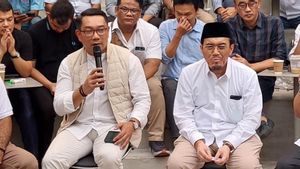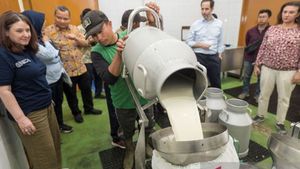JAKARTA - The Sapta Usaha Tani strategy, innovation in diversifying commodities and millennial farmers has made the Central Java agricultural sector experience a tremendous leap. Throughout 2020-2021, Central Java has an increase in exports of IDR 8.3 trillion for agricultural commodities.
In 2021, Central Java will become the second largest rice producer in Indonesia after East Java with 9.6 million tons. Horticultural commodities in the form of food and plantation crops such as soybeans, petani, jengkol, cardamom, and coffee, are also in demand by the international market.
In fact, coffee produced by Central Java agriculture already has nine export destination countries, namely Egypt, Italy, Georgia, Japan, Iran, United Arab Emirates, Spain, South Korea and Taiwan. Achievement in agriculture, made Central Java win the 2021 Abdi Bakti Tani award from the Indonesian Ministry of Agriculture (Kementan) for the Provincial Category with the Export Value of the Highest Agricultural Commodity. Ganjar's commitment to services and subsidized fertilizer management also made the Ministry of Agriculture award award in 2022, or four times in a row since 2019.
The world of Central Java's agriculture is growing following an environmentally friendly organic agricultural trend, and the emergence of millennial farmers as part of innovation. The existence of millennial farmers currently reaches 33.7 percent of the approximately 3 million farmers in Central Java. They have quality, innovative and adaptive human resources to technology so that they contribute to agricultural modernization.
Riza Azyumardha Azra, founder of Mocaf Indonesia's House, revealed that she is interested in pursuing the agricultural world because she sees the abundant production of cassava in her residence, Banjarnegara, Central Java. According to the electrical engineering scholars, cassava has not been widely cultivated as mocaf flour that has the same characteristics as flour.
At his Mocaf House restaurant, young people usually hang out to enjoy the creation of contemporary menu dishes such as fried chiken, chicken noodles and everything made from Mocaf, as a form of education.
"In the world of sharing, we make it one of Central Java's steps for local sovereignty, helping cassava and Indonesia can have food sovereignty without having to import," said Riza Azyumardridha Azra.
Meanwhile, the trend of consumption of organic vegetables is a promising business opportunity. Millennial farmer asa Getasan, Semarang Regency, Sofyan Adi Cahyono is encouraged to develop organic farming or without chemicals. After graduating from college in agriculture, Sofyan also sought information about the market for vegetables.
Now he also owns organic farming gardens and invites 30 youths in his village to join the Citra Muda Farmers Group.
What Sofyan did was quite promising. They can reap a turnover of Rp. 100 million to Rp. 150 million per month. When the Covid-19 pandemic hit Indonesia, demand did not go down but skyrocketed
"The Omzet is around Rp. 300 million," said the Ministry of Agriculture's Millennial Farmer Ambassador.
While attending the Soropadan Agro Expo in Temanggung, last October 2022, Ganjar Pranowo was optimistic that millennial farmers in Central Java could realize food sovereignty. According to him, millennial farmers have proven to have many useful agricultural innovations in encouraging production. This can be seen from how they farm very modern.
"This is our optimism. In the midst of a difficult situation, we have a lot of alternative food crops, including other products," said Ganjar.
On the other hand, the Head of Central Java Distabun, Supriyanto, said that the supporting factors for the success of food production are the consistent application of agricultural business apta, namely the selection of superior seeds, land processing, irrigation, balanced fertilization, control of disease pests, handling harvest and post-harvest, as well as marketing agricultural products.
He emphasized that the Central Java Provincial Government made a number of innovations to boost agricultural and plantation products. The breakthrough includes organic agriculture, diversification of agricultural and plantation commodities, digitization of services, innovation competitions, and the existence of millennial farmers.
''Our organic farming refers to SNI 6729 2016 and Permentan 64 of 2013 concerning organic farming systems,'' he said. Organic agriculture is a necessity because it is rich in vitamin nutrients, safe to consume and environmentally friendly.
Activities to support organic farming, such as identification of prospective recipients and prospective agricultural locations, socialization, technical guidance, assistance for organic agricultural processing equipment, and training on organic fertilizer manufacturing.
Currently, he said, Central Java already has 110 organic farmer groups certified by SNI. There are also international certifications such as the Tani Bangkit Merbabu Group in Getasan which is engaged in vegetable fields. Added, strategic commodities in Central Java are tobacco.
Currently, there are 510,454,000 trees planted in an area of 36,461 hectares in Central Java. Diversification of leaves and tobacco stems, including toothpaste, mouthwashing, lotion, natural soap and aromatherapy.
Meanwhile, the former Head of Central Java's Distanbun, Suryoirdro, hopes that the Central Java agricultural sector will grow positively to support national food, and always experience a surplus of food commodities. In addition, the empowerment of farmers and festivals for coffee and tobacco must be massive.
''The application of services for Alsintan (farm equipment and machinery) such as tractors must be optimized to help farmers accelerate the planting and production process. It's free, the important thing is to borrow health, and return home healthy,'' he added.
He hopes that Central Java's innovation through agricultural and organic farming efforts will continue to grow, considering this to address the international issue, namely the Sustainable Development Goals (SDGs), in particular improving environmental quality with the low carbon development program.
''I still remember that since 2014, Pak Ganjar ordered Central Java agriculture to go organic,'' he said.
The English, Chinese, Japanese, Arabic, and French versions are automatically generated by the AI. So there may still be inaccuracies in translating, please always see Indonesian as our main language. (system supported by DigitalSiber.id)













